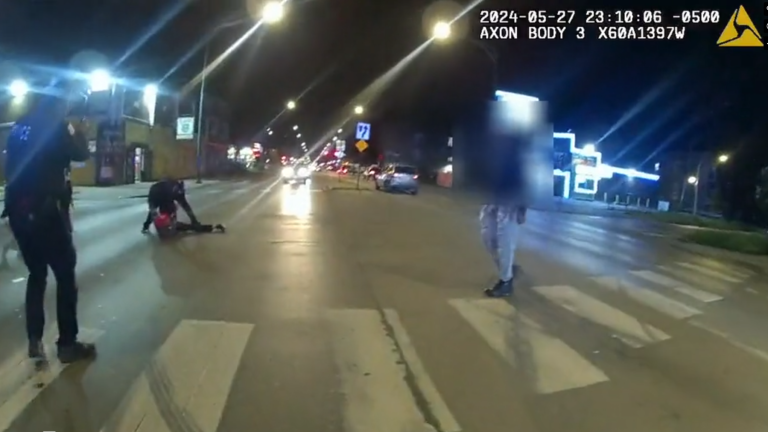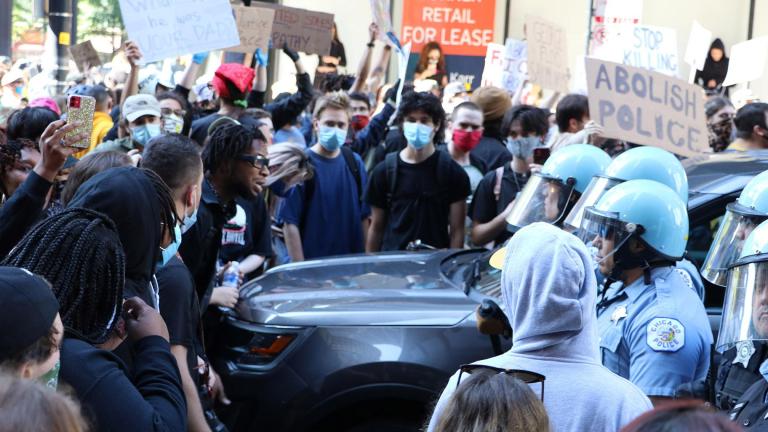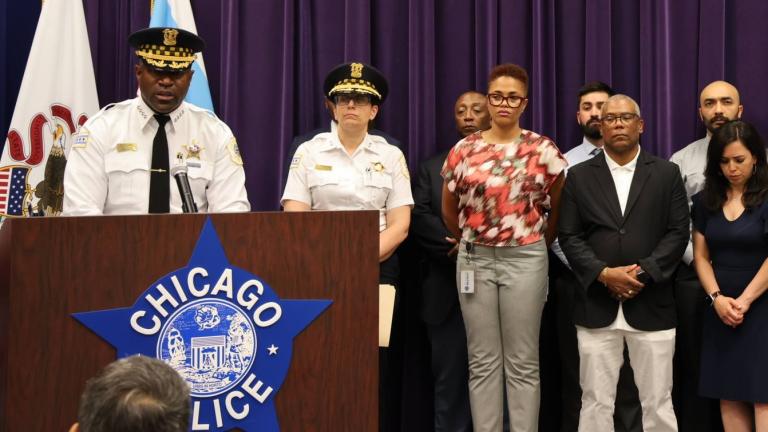A system designed to alert Chicago Police brass about which officers have been the subject of repeated police misconduct allegations could have been rolled out citywide in May 2021 — but it has yet to be fully implemented nearly two and a half years later, according to records obtained by WTTW News.
The University of Chicago Crime Lab began work on the so-called Officer Support System, also known as OSS, in 2016, and began testing it in a South Side police district in September 2020, only to face repeated and lengthy delays, caused in part by decisions by CPD leadership to transfer the staff members assigned to run the system to patrol, according to a letter obtained by WTTW News through the Freedom of Information Act.
In that October 2022 letter to former Supt. David Brown, University of Chicago Crime and Education Lab Executive Director Roseanna Ander, who helped craft the system, offers to help CPD leadership implement the system but makes it clear that the crime lab has done everything in its power to make it a reality, only to face myriad delays.
Ander told WTTW News there is a clear need for a system that flags officers with multiple complaints and lawsuits to prevent incidents that make it impossible to restore the public’s trust in the beleaguered Police Department, which has faced decades of scandals, misconduct and brutality.
There have been seven full-throated efforts to reform the Chicago Police Department — none of which have been successful.
Chicago Police must implement an early-warning system under the terms of the consent decree, the federal court order designed to compel the Chicago Police Department to change the way it trains, supervises and disciplines officers. CPD is in full compliance with just 5% of that 2019 court order, city data shows.
Inspector General Deborah Witzburg has repeatedly warned that true police reform will be impossible until the city starts collecting and analyzing data to “effectively manage the risk of expense to the city and harm to its residents arising out of CPD’s operations.”
City officials rarely link settlements or verdicts — which can run into the tens of millions of dollars — to specific complaints of misconduct, and do not analyze what led up to any of the incidents in an effort to prevent similar cases by disciplining officers, retraining them or offering them counseling or other treatment, Witzburg said.
If the city does not implement an early-warning system that passes muster with the federal court, it could face sanctions and additional layers of oversight, under the terms of the consent decree.
Representatives of the Chicago Police Department said in a statement the Officer Support System remains in the pilot phase as officials “review and assess the program and it’s corresponding policy to ensure it is being utilized effectively ahead of a citywide rollout.”
“As we move forward in our efforts to launch this program within every police district, we are continuously providing training to department supervisors on how to recognize a need for support and intervention for the officers under their command,” according to the statement.
However, a CPD spokesperson did not respond to detailed questions about the causes of the delays that have stretched for years or offer a timeline for the system’s implementation citywide.
Mayor Brandon Johnson told WTTW News at an unrelated news conference Monday afternoon he could not speak to the “snail or turtle” pace taken by the Lightfoot administration to “all forms of governance,” but said implementing the consent decree was one of his “top priorities.”
“We are moving with expediency,” Johnson said, vowing to act with more hurriedness to make sure the people of Chicago know we that we take the consent decree seriously.”
New Demands for Police Reform Spotlight Need for Early-Warning System
Funded by local philanthropists, including Citadel hedge fund manager Ken Griffin, the Officer Support System was designed not to punish the officers it identified, but to flag them for counseling, assistance and retraining.
In the wake of the unrests and protests triggered by the May 2020 murder of George Floyd by a Minneapolis police officer who had been the subject of multiple complaints, former Mayor Lori Lightfoot promised to roll out the system, which had been under development for four years at that point, within 90 days.
Lightfoot met that self-imposed deadline by launching the system in the Far South Side’s Calumet (5th) Police District as part of a pilot program in September 2020. But the system is not in use in any of the city’s 21 other police districts, more than three years later.
“We believe [the system has] been ready for department-wide implementation since at least May 2021 and have been prepared to assist CPD with that deployment as needed,” Ander wrote.
In December 2021, the rules governing the system were revised, but never finalized, according to documents posted online by the Chicago Police Department. The approval of that policy was delayed by a lengthy review process conducted by the federal court monitors implementing the consent decree and the office of Illinois Attorney General Kwame Raoul.
A spokesperson for Raoul did not respond to questions about that process from WTTW News.
Ander’s letter details more than a half-dozen major causes of the delay that thwarted efforts to roll out the system citywide and complete an effort that started nearly 30 years ago under former Supt. Matt Rodriguez.
That push in the mid-1990s was blocked by the police union during negotiations over the contract for the Fraternal Order of Police Lodge 7, which dictates the way most officers can be disciplined. Police Union President John Catanzara did not respond to questions from WTTW News about the latest version of the early-intervention system.
In 2015, former Mayor Rahm Emanuel tried again, calling for a formal early warning system to be put in place after video of now-former Chicago Police Officer Jason Van Dyke shooting 17-year-old Laquan McDonald 16 times created a firestorm. Emanuel left office in 2019 without implementing such a system.
A spokesperson for Lightfoot referred questions about why she did not implement the early-warning system to the Chicago Police Department, despite telling reporters in June 2020 it was crucial part of efforts to reform the Chicago Police Department in the wake of Floyd’s murder.
The system designed by the crime lab was pitched to officers and the news media as an effort to improve officer wellness, not as a system that would be used to trigger disciplinary action against an officer.
Not only was that framing designed to allay officers’ concerns about the data it was gathering on them, it was also crafted to blunt opposition from the police union and prevent them from derailing the system’s implementation by challenging it as a violation of their collective bargaining agreement with the city.
Officers flagged by the system after drawing multiple lawsuits and complaints would be offered counseling or retraining, in the hopes of heading off a more serious — or costly — incident, officials said.
Advocates of police reform said that approach was insufficient to address the Police Department’s deep-seated problems, which have led to repeated scandals and more than $197.7 million in payments from Chicago taxpayers to resolve police misconduct lawsuits from 2019 to 2021.
Nearly half of those cases named 116 Chicago police officers whose alleged misconduct led more than once to payouts between 2019 and 2021, costing taxpayers $91.3 million, according to an analysis of city data by WTTW News.
A spokesperson for the Chicago Department of Law, led by Corporation Counsel Mary Richardson Lowry, said the department is in the process of launching a new legal case management system to provide officials with “better data and analysis.” However, that system is not expected to be completed until March 2024.
Lowry’s spokesperson declined to comment on the city’s litigation strategy, but said the office is “committed to working with the Chicago Police Department and the new superintendent, once appointed, to explore effective ways to minimize risk.”
Causes of Delay Identified
Shortly after the test of the early-warning system began in September 2020, it was beset by delays, according to the letter sent to the city’s top cop by the head of the crime lab.
The first version of the computer application, developed by CPD and software firm Clarity Partners, “proved difficult to provide an intuitive user experience.” That prompted a second version of the system to be built and implemented in the 5th Police District in April 2021.
Efforts to expand the system to additional districts never came to fruition, while officials “focused on other supervisory related consent decree requirements,” including efforts to ensure that each officer routinely reported to the same supervisor, according to Ander’s letter.
Even in the single district where the system was in use, it was not being used as intended by police brass, and alerts generated by the system “did not appear to be addressed in a timely manner,” according to Ander’s letter.
In addition, efforts to fully implement the early-warning system the 5th District in the months leading up to Ander’s October 2022 letter slowed even further when “many of the staff from the OSS unit have been transferred to field assignments.”
During the same time period as those transfers, Robert Boik, who served as executive director of the police department’s Office of Constitutional Policing and Reform, was fired by Brown, days after Boik warned that Brown's decision to move 46 employees to patrol shifts would violate the consent decree.
Boik was replaced by Chief Tina Skahill, who resigned on June 17 after than less than a year in the post. When she informed department leaders of her retirement, Skahill told them she was stepping down because of retaliation and invoked protections under the state’s whistleblower law.
The original terms of the consent decree called for its reforms to be completed by 2024. In March, city officials and police brass acknowledged they would not meet that deadline and agreed to extend the deadline for the reforms to be fully implemented by an additional three years.
Contact Heather Cherone: @HeatherCherone | (773) 569-1863 | [email protected]







